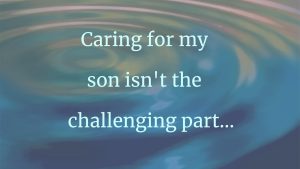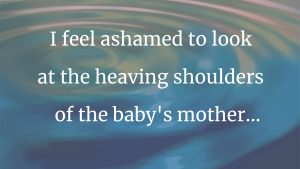Andrea Eisenberg ~
Many years ago, on a busy day in my obstetrics-and-gynecology office, one of my partner’s patients came in for “bleeding, early pregnancy.” Since my partner wasn’t in that day, I saw the woman, whose name was Sarah. After we’d talked a bit, I examined her and did an ultrasound. As I’d expected, she was having a miscarriage. Feeling sorry that Sarah had to hear it from me, rather than from her own doctor, I broke the sad news.
We discussed the options: Did she want to have a D&C, or let nature take its course?
“I’m not sure,” she said. “I need some time to decide.” I agreed that this was understandable and left the room so that she could dress. Having notified my partner, I thought no more about it.
A month later, I received a letter from Sarah accusing me of callousness and insensitivity in our encounter.
“At a moment that was so awful for me, you didn’t care for my emotional needs,” she wrote. “If you’d made even a small gesture, like offering me a quiet place to call my husband, or walking me out when I was leaving, that would have made a difference.”
This letter stung me to the core. I felt crushingly embarrassed.
I thought I was a more sensitive person than that, I reflected painfully.
But, pondering her words, and trying not to let my sense of humiliation get in the way, I realized that perhaps Sarah had given me a gift.
She was right, I reflected. I missed the opportunity to comfort her in her moment of need. Although my schedule was busy, taking an extra moment to offer her caring and comfort wouldn’t have affected my other patients much–and it would have made a world of difference to her. I appreciated her courage and honesty in sending me the note.
Sarah’s letter stirred up memories of my own pregnancy losses. I have two daughters, three years apart in age. Between their births, I also suffered two miscarriages. Looking back, I could see that how I’d handled my own feelings might have affected how I’d handled Sarah’s as well.
With each of my miscarriages, I myself had suspected what was happening, but then immediately rejected my own diagnosis.
After my first daughter’s birth, I’d become pregnant again, to my joy–and to some ambivalence in my husband, who at that point felt unsure that he wanted more children.
Shortly before the eight-week checkup visit with my ob/gyn, I sneaked into my office’s ultrasound room and took a quick look, just for fun. I expected to see a normal fetus…but I didn’t.
Everything’s all right, I reassured myself. You just didn’t see the image clearly. I didn’t tell anyone.
Two days later, in my OB’s office, tears began to flow as the ultrasound image confirmed what I’d refused to accept: There was no heartbeat.
My OB scheduled a D&C for the next day, as I was soon to travel to California to help my sister, whose husband was ill. Twenty-four hours after the D&C, I was on board an airplane to San Francisco. Everyone around me, my husband included, assumed that I was okay. I was an OB, after all; I understood miscarriages. This collective obliviousness allowed me to stay oblivious, too.
During the trip, I ignored my menstrual pads’ daily bloody reminder of a life lost and focused on helping my sister. It was a good distraction. Afterwards, back at work, and seeing pregnant women daily, I found my loss much tougher to ignore. Rather than face it, though, I numbed myself and simply moved on; it felt so much easier just to deal with my patients’ needs. I reassured myself that I’d conceive again as I’d seen many others do.
Sure enough, within a few months I was pregnant. This time my eight-week ultrasound revealed a nice strong heartbeat. In addition, I was suffering my usual pregnancy symptoms–low-grade nausea, a horrible taste in my mouth, a craving for greasy foods. I heaved a sigh of relief.
A couple of weeks later, I once more sneaked a peak with the ultrasound. Again, something seemed off.
This time, I felt embarrassed, thinking, I probably didn’t do the ultrasound right.
As before, I didn’t tell anyone; I carried around my suspicions until my next appointment.
There, in the dark ultrasound room, I saw the fetus on the screen, looking too small, and with no heartbeat. Not again….Tears pouring down my face, I got dressed and walked down the hall to my OB’s office.
The next day was Yom Kippur, the holiest Jewish holiday of the year. When my doctor scheduled my D&C for Yom Kippur, I didn’t blink an eye; I just wanted it done.
I called my husband from her office. “You’re probably relieved,” I told him. “You didn’t want this pregnancy anyway.”
Remembering this afterwards, I cringed: What a horrible thing to say. But in the moment, I felt so angry, hurt and sad that I just wanted to lash out.
I returned to work after only one day off, needing to distract myself from my emotional pain by immersing myself in my regular routine. And I needed my daughter to have her regular routine–to keep life “normal” for her. But I couldn’t turn off my ruminations: I just know that the miscarriage was my fault….I’m being punished for my past mistakes….I don’t deserve to be pregnant again.
When friends tried to offer consolation, I’d reply, “Yes, I know, miscarriages are more common at my age. Yes, I know miscarriages happen because cells don’t divide right. Yes, I know there was nothing I could do to that would have made a difference”–all the things I myself had said to patients to try to comfort them. But deep inside, despite all of my scientific knowledge, I couldn’t shake my guilty feelings.
I’m not sure what got me out of my rut. Part of it was finally talking more openly to my friends about it, part of it was time, and part of it was not giving up hope that I could become pregnant again. Gradually I righted myself and let the painful feelings subside. And about six months later, I did conceive.
At eight weeks, all my pregnancy symptoms disappeared–no bad taste in my mouth, no nausea. Panicked, I called my OB, who had me come in immediately. The ultrasound showed a viable fetus, and this time, my tears were tears of relief.
I know, now, what a debt of gratitude I owe to Sarah. Her letter opened my eyes to the enormous impact I have on patients, both by what I say or do and what I don’t say or do. On a personal note, it helped me to realize that, in cutting myself off from my own pain and grief, I had, by extension, cut myself off from feeling Sarah’s pain as well.
I hope that from now on, no matter how busy my schedule, I’ll never miss another chance to emotionally support a patient–or anyone else in my life, myself included.
About the author:
Andrea Eisenberg has been an obstetrician/gynecologist in the Metro Detroit area for nearly twenty-five years. She has experienced countless intimate moments with her patients, sharing their joys, heartaches, secrets, losses and victories, and she documents these stories on her blog, secretlifeofobgyn.wordpress.com. Her work has appeared in Intima and in the More Voices feature of Pulse, and she is a guest blogger on KevinMD. “In my writing, I strive to capture the human side of medicine, and what doctors think and feel in caring for patients. I find that writing helps me to slow down, to let go of some of the heartaches and stresses and to cherish some of the triumphs in my work.”
Story editor:
Diane Guernsey








6 thoughts on “Too Close for Comfort”
Thank you. I’ve been a patient in this practice since 1989 and Dr. Leach and Dr. migdal were Thea best for me and my struggles to get and stay pregnant. I miss them and know they helped many families through the trying times both medically and emotionally.
Thank you, for sharing your story. It touched me deeply. I am a Licensed Clinical Social Worker who has worked in the field for almost 30 years, 20 of them in Emergency Departments. I know that at the end of the 20 years in the ED, I cut myself off from my patients pain and grief in order to survive all the trauma I saw day in and day out. I wrote words of yours down (changed a few to tailor it to my situation). I wrote, “By cutting myself off from my own pain and grief, I will by extension, cut myself off from feeling my patients pain as well”. I am currently in private practice and I want to remember yours words.
Your story reminds me of a patient who came in for fatigue & myalgias. She thought she had Mono. She mentioned as an aside, something about a miscarriage. I asked more about the miscarriage. It was 6 months before, she rationalized it all, percentages of pregnancies, etc. She felt that couldn’t be the cause. I told her I’d get some labs, but was suspicious that it was grief. Before her next visit she went to a Christian conference where they talked about grief and a speaker mentioned being mad at God. It upset her and she left in tears. Her labs were normal, and when she returned telling of her conference, I shared my own experience with loss and being mad at God. It upset her, but next visit, she was much better. She’d come to grips with her loss and allowed herself to grieve. From the time the test is positive, in our hearts it’s a baby, not a statistic. It hurts to lose a baby at any stage. It’s important for ourselves and our patients to acknowlege this loss.
Thanks for this. I too had 2 children, with 5 early pregnancy losses between the successful pregnancies. I felt that the Lord was trying to make sure I got the message about the grief, and never to forget it. Patients need our concern, our compassion and our tender loving care. I am glad you reacted to the criticism with a recognition of what you could do differently. As you said, it might only take a few moments, but make an enormous difference to the grieving patient.
A very good, thoughtful narrative. Doctors are so rushed these days that often they forget that the emotions of their patients about a health problem need to be addressed, too. Thankfully, some do.
Also, wonderful haiku!
Thank you for your honest sharing.